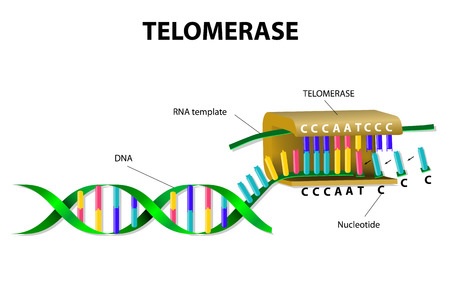Telomeres and Aging – Could a Simple Test Extend Your Life?

If you understand the relationship between telomeres and aging, you may be able to slow down the aging process.
Death is inevitable for all of us; and because most people no longer want to age gracefully, we have developed short-term solutions to hide the signs of the aging process, including hair dye, Botox injections, and surgeries for sagging skin.
We want to age beautifully. We want to age slowly -- extending our life span so that we have more time with our loved ones, to pursue our passions, or to make a positive impact on the world.
If you want to get to the finish line of life as slowly as possible, and make the most of your time in the world, it’s important to learn about telomeres and the aging process.
Telomere research may have uncovered a powerful weapon against the signs of aging and may help you live the healthiest, longest life possible.
What Is a Telomere?
Have you ever sipped from a long plastic straw with a small plastic cap on the end? These straws are commonly found on reusable water bottles and cups distributed at ball games and amusement parks. The end cap is designed to hold liquid inside the cup, and they function much like telomeres inside your body.
Each cell of your body contains chromosomes that hold your DNA. Telomeres cap the ends of each chromosome, preventing them from sticking together or losing DNA data every time your cells divide. Just as your cup might leak liquid if you were to lose the little end cap, it’s believed that chromosomes may not retain their DNA data over time without telomeres capping their ends.
The Telomere Aging Theory
There are competing theories on telomeres and aging in existence today, but many scientists believe wholeheartedly in the telomere aging theory. This theory states that cells naturally divide throughout their life span.
During the process of cell division, telomeres are shortened as we continue to age. This allows the chromosomes to maintain their DNA data, but shorter telomeres equal older chromosomes at risk of dying off. Once a telomere shortens to a “critical” length, the cell has reached the end of its life and can no longer be replicated.
This process of dividing and dying off continues repeatedly throughout your lifetime. Many scientists now believe that those dying cells with shortened telomeres are what lead to life-threatening diseases and the general breakdown of the human body.
The Bright Side of Telomeres and Aging

While that may sound depressing, there’s a bright side to this aging theory. There is a growing body of evidence that various lifestyle factors can increase or decrease the rate of telomere shortening. If you can keep your telomeres long, you can prevent your cells from dying off and slow the aging process
An enzyme known as telomerase naturally extends the life of select cells by adding to sequences inside the telomeres. Unfortunately, these enzymes are found mostly in germ cells, reproductive cells in sperm and eggs, and cancer cells. Scientists have shown that it’s possible to force cancer cells to die out by shutting down telomerase so that rapid growth is no longer possible.
The potential to cure cancer without toxic treatments like chemotherapy is exciting, but look at this in reverse. If taking telomerase away leads to the shortening of telomeres and the death of cells, then adding telomerase to other cells throughout the body could stop the shortening of telomeres and the death of cells. This makes those little chromosome caps quite powerful for researchers exploring solutions to aging.
Simple Ways to Lengthen Your Telomeres
You don’t have to wait for scientists to deliver telomerase in a bottle to start improving the length of your telomeres, and by association, your life. Researchers have found that many lifestyle factors contribute to the length of telomeres.
You can help prevent your telomeres from shortening prematurely by making the following lifestyle changes.
- Stop smoking.
- Maintain a healthy body weight.
- Avoid alcohol.
- Regularly perform a high level of physical activity.
- Manage the stress in your life.
- Be sure to get the sleep your body needs.
How long are your telomeres right now? You can find out by taking the Telomeres and Aging Test. It requires a simple prick on the tip of your finger to produce a small sample of blood. This sample is mailed directly to a laboratory, where your results are processed and kept confidential. You can take the test a second time to see how you’re progressing after six months or longer.
What is Your Telomere Age?
Find out with a TeloYears test today.
More Topics That May Interest You
Some of the advertisers on my website are affiliate partners, which means that I may receive a small commission from any sale, at no extra cost to you.
For example, the Amazon affiliate advertising program is designed to provide a means for sites to earn fees by advertising and linking to amazon.com.
Your tips and purchases help to support this free-information website.
Thank you.
The content of this website is for informational purposes only and not intended to be taken as a replacement for professional medical advice, care, diagnosis or treatment by a doctor, dietitian, physical therapist, nutritionist or fitness instructor.
DO NOT BEGIN ANY EXERCISE PROGRAM WITHOUT CHECKING WITH YOUR DOCTOR FOR UNDERLYING CONDITIONS THAT MAY PREVENT YOU FROM DOING SO.




